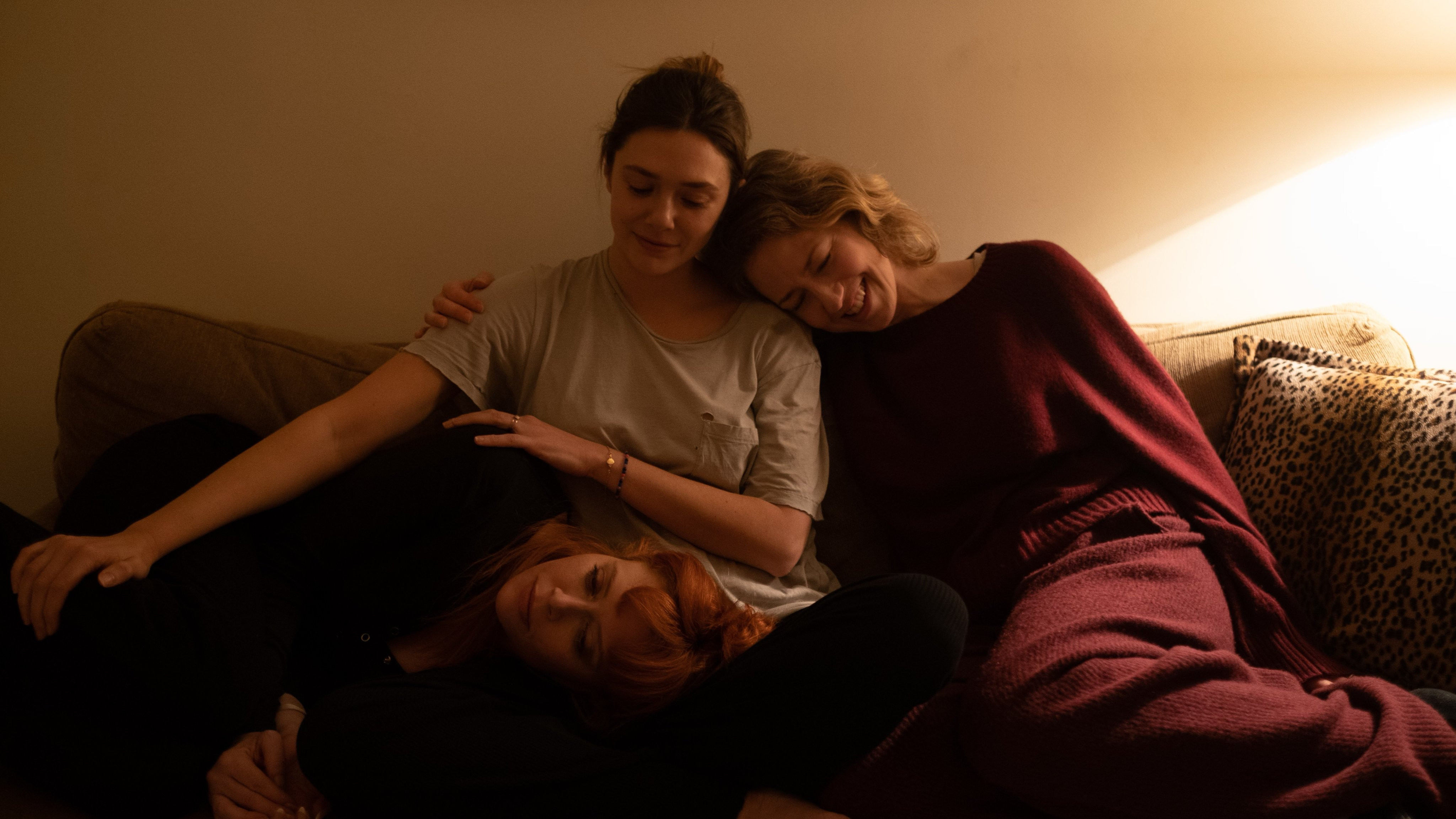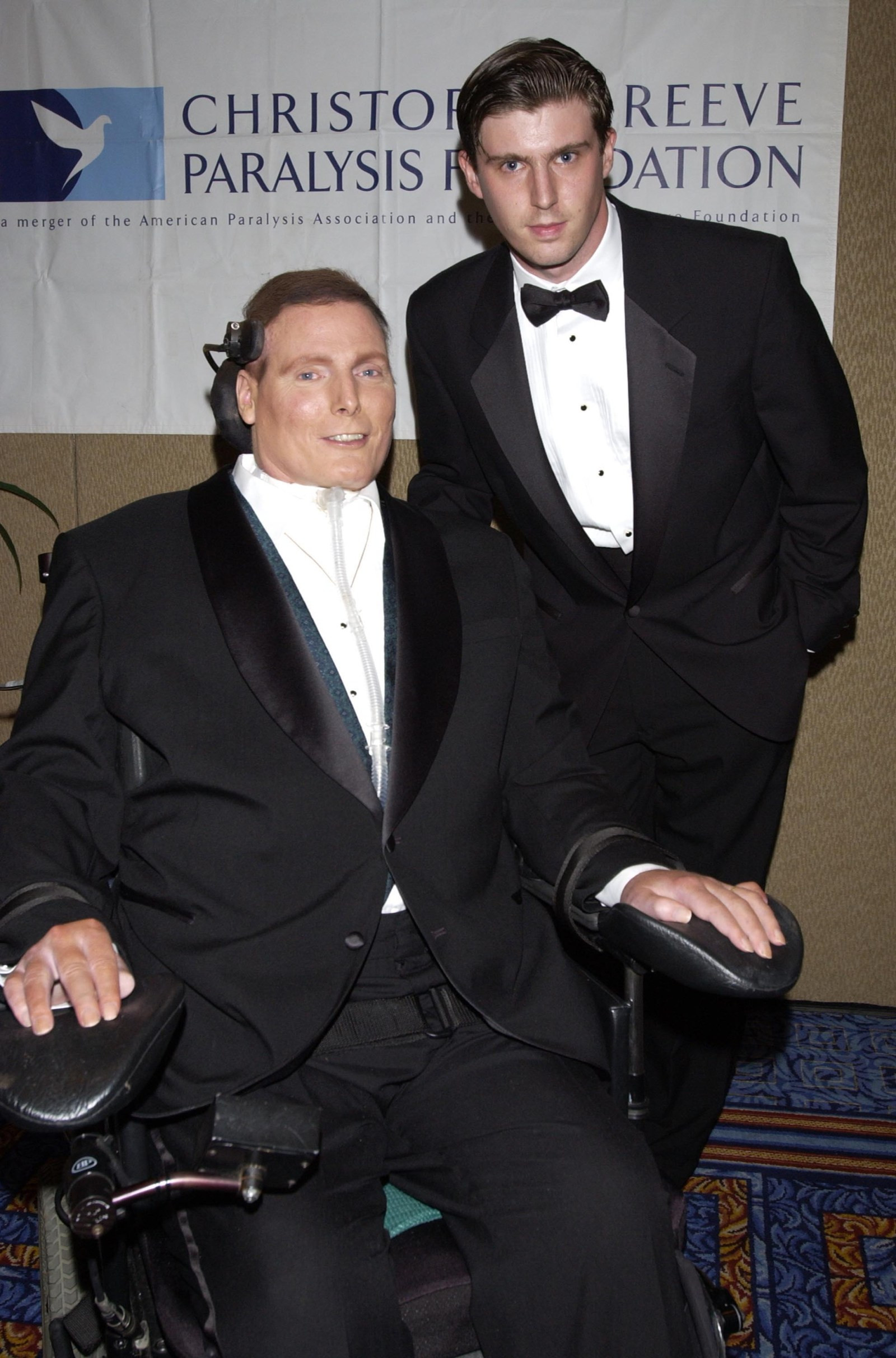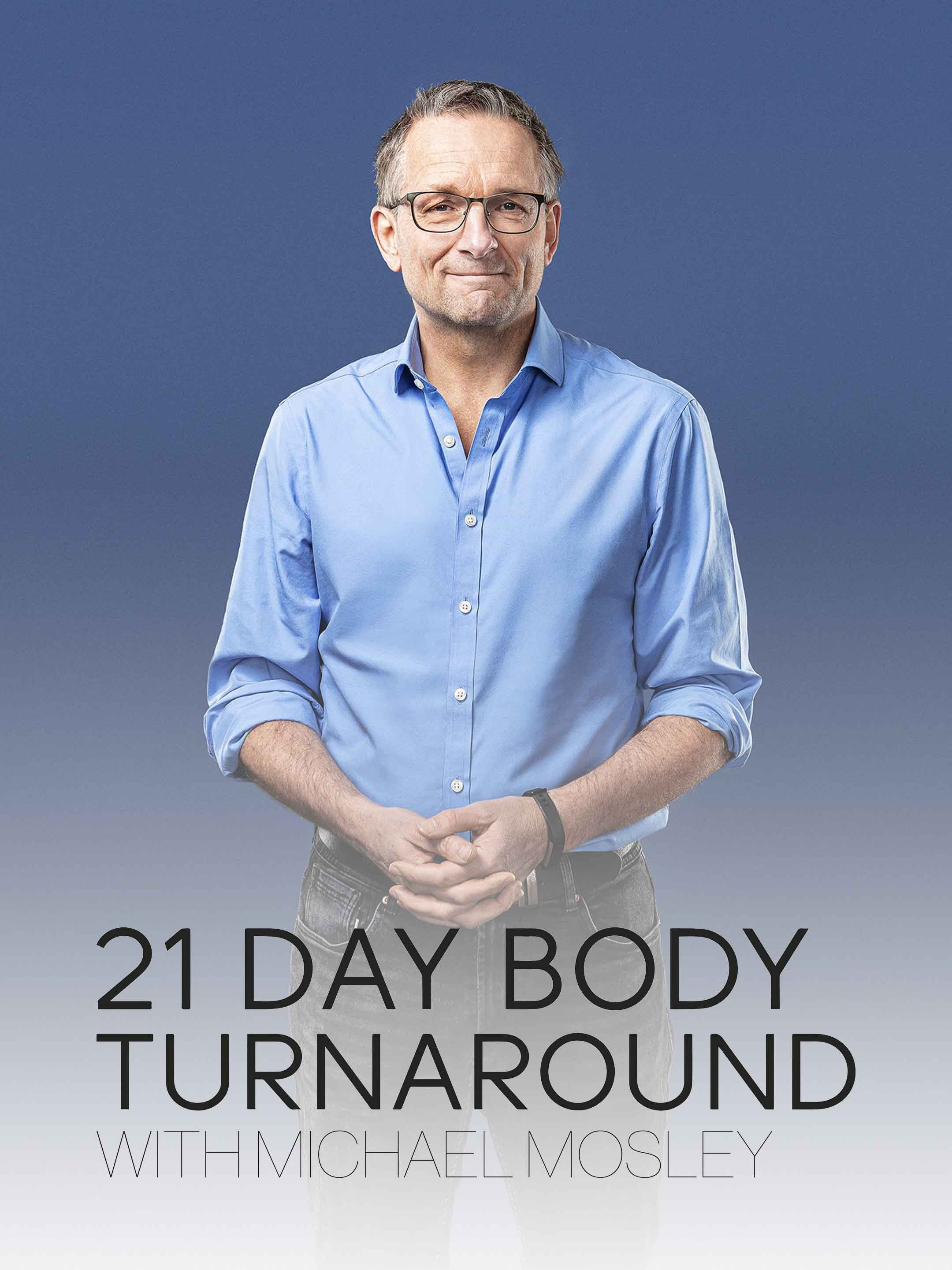It would be pushing it to call His Three Daughters, written and directed by Azazel Jacobs (French Exit), a modern-day reimagining of King Lear. Vincent (Jay O. Sanders), the dying father whose impending disappearance the movie is structured around, is far from a powerful monarch: He spent his career as a mid-level functionary in the New York City government and lives in a rented apartment in one of Manhattan’s middle-income housing blocks. But for the three women who have gathered at that apartment to be with Vincent as he enters the last stage of hospice care, his modest, cluttered flat constitutes a kind of kingdom, the only place left where they can gather to remember their childhood. The struggle that will take place among the daughters as the story unfolds is not a Lear-style battle for the spoils of succession, but an attempt to reconcile their memories of the children they were with the adults they have become.
The three daughters come from two different mothers, a fact that gains importance as the film goes on: The oldest, Katie (Carrie Coon), and the youngest, Christina (Elizabeth Olsen), share the same mother, while the one in the middle, Rachel (Natasha Lyonne), only became part of the family upon Vincent’s remarriage after his first wife’s death. Rachel’s mother has since died too, and in adulthood the siblings have grown apart. Katie lives a subway ride away in Brooklyn, but visits rarely; she’s preoccupied with her rebellious teenage daughter and, to judge by her high-strung temperament and sometimes imperious manner, a stressful but prestigious job. Christina lives in an unnamed state far from New York, with a loving husband and a toddler she dotes on to a sometimes cloying degree; she’s a hippie of sorts who maintains a daily yoga practice and once followed the Grateful Dead on tour. Of the three, Rachel has long been the closest to their dad, both emotionally and physically: Even before he got sick, she shared the family apartment with him, roommate-style. Rachel has no job, but earns spare cash from betting on multiple sports events a day. She also smokes weed, lots of weed, freely admitting to her sisters that she is a wake-and-bake stoner who kicks off each day with a hefty blunt.
It’s not clear how long Vincent has been ill with cancer, but as the movie begins, he has stopped eating and is only intermittently conscious. Two hospice workers rotate in and out to help with care during the day, so the sisters’ main task is to pay occasional visits to their father’s bedside as they wait in the adjoining rooms for him to die. This leaves a lot of hours in the day and night for the three women to clash over everything from cooking and dishes to Rachel’s omnipresent pot smoke to the right wording for the obituary Katie is trying to write for their father.
Most of all, the sisters gripe about their own fraught interpersonal dynamics, some of them decades in the making: the way Katie’s eldest-child bossiness can make the other two feel more like her employees than her siblings, or the way Christina’s calm air of self-possession can come off as smug perfectionism, or the way Rachel, a stepsister whose long-ago arrival in the family disrupted the existing order, has always been subtly made to feel like she’s less Vincent’s daughter than her sisters are, even though she was the one to care for him in his final years. All three have legitimate grievances to air, but they’re unable to even touch on these subjects without one or more of them crying, storming out of the room, or—in Katie’s and Rachel’s case—getting into a shouting match complete with physical shoves, while their would-be peacemaker of a little sister stands in the middle screaming, “You’re both assholes!” If the daughters are structurally analogous to Lear’s, there is nary a greedy Regan or Goneril among them. They are all, in their way, Cordelias, guardians of their own private love of their father and convinced only they know how to care for him as he needs in his final moments.
His Three Daughters, which is currently in theaters before coming to Netflix on Friday, is an almost completely one-location drama. Except for a handful of scenes in the building complex’s central courtyard and one sequence in which Lyonne’s Rachel hits the streets to buy fresh smoking supplies and greet a neighbor’s dog, the intricate and often painful history of a whole family’s life plays out in a few cramped rooms while the machine measuring Vincent’s vital signs beeps steadily on from his otherwise silent bedroom. Such a claustrophobic setting could easily have made the movie feel like a filmed play, and there is at times a stiff theatricality to the first hour, as we get to know the sisters’ backstories one by one through their encounters with each other and with a caring health care worker aptly named Angel (Randy Ramos, Jr.).
Still, cinematographer Sam Levy’s deftly handled camera manages to invest the limited space of that apartment with a specific emotional topography, a land with its forbidden zones (Vincent’s bedroom, which the grief-stricken Rachel has trouble making herself enter), contested spaces (the kitchen and dining room, frequently commandeered by control-freak Katie), and ambivalently received guests. Rachel’s boyfriend, played by a never-better Jovan Adepo (Babylon, 3 Body Problem), dresses Katie down with scathing honesty when she tries to treat him as an interloper in the home where, as he points out, he’s probably eaten more family meals in recent years than she has. The racial, sexual, and class overtones of that tense confrontation are packed as tight as a crate of dynamite, but Jacobs’ script lets those tensions remain unresolved. He’s less interested in who is right in any given encounter than in how the stubborn insistence on being right can keep perfectly well-meaning people from listening to the words of those right in front of them.
I’ve tried to avoid spoiling whatever there is to be spoiled in a movie with an ending as inevitable as the fate of a terminally ill person. But I will say—with as much clarity as I can muster through the tears once again blurring my vision—that the final 15 minutes or so of His Three Daughters are what lifts the movie out of “impressively fine-tuned family drama starring three excellent actresses” into the stratosphere of “transcendent work of art whose insights into the meaning of human impermanence you may want to change your life to be worthy of.” You’ll notice that the first actor mentioned in this review, Jay O. Sanders, has not come up again so far. That’s because Sanders gets only one real scene, but brother, what a scene it is: a tour-de-force monologue delivered with immense humanity and tenderness, ending in a devastating perspectival shift that’s handled by the director with such delicacy you have to revisit it in your mind on the way home to sort out exactly what happened.
Sanders, an actor’s actor who has done plenty of film and TV but is perhaps best known for his work in theater (I saw him in a staged reading of the Henry plays a few years ago, playing an unforgettably vulnerable Falstaff), pulls off the unlikely feat of all but stealing the end of the movie from the three exceptional actors with whom we’ve spent the past two hours. But of course, “stealing” is a concept that makes no sense in the context of an ensemble collaboration as generous as His Three Daughters. Vincent’s late-in-the-movie emergence from his beeping lair doesn’t take anything away from the deep-rooted conflicts being hammered out by his squabbling offspring. On the contrary, his sudden appearance gives them, and the audience, a gift neither they nor we could have foreseen. The movie’s final moments shimmer with the mystery left behind by that last paternal encounter. The Lear comparison may not hold up throughout—there are no murderous sisters or madmen wandering through blasted heaths—but one line spoken by Lear to Cordelia near the play’s end does capture something of the mutual, if provisional, grace that these three sisters and a father finally find their way to: “When thou dost ask me blessing, I’ll kneel down/ And ask of thee forgiveness.”
Death isn’t like it is in the movies, a character explains in “His Three Daughters.” Elizabeth Olsen’s Christina is telling her sisters, Katie (Carrie Coon) and Rachel (Natasha Lyonne), a story about their father, who became particularly agitated one evening while watching a movie on television in the aftermath of his wife’s passing.
It’s not exactly a fun memory, or present, for any of them. This is, after all, also a movie about death.
The three women have gathered in their father’s small New York apartment for his final days. He’s barely conscious, confined to a room that they take shifts monitoring as they wait out this agonizingly unspecific clock. But even absent the stresses of hospice, tensions would be high for Christina, Katie and Rachel, estranged and almost strangers who are about to lose the one thread still binding them. Taken together, it’s a pressure cooker and a wonderful showcase for three talented actors.
Writer-director Azazel Jacobs has scripted and filmed “His Three Daughters,” streaming Friday on Netflix, like a play. The dialogue often sounds more scripted than conversational (except for Lyonne, who makes everything sound her own); the locations are confined essentially to a handful of rooms in the apartment, with the communal courtyard providing the tiniest bit of breathing room.
Jacobs drops the audience into the middle of things, dolling out background and information slowly and purposefully. Coon’s Katie gets the first word, a monologue really, about the state of things as she sees it and how this is going to work. She’s the eldest, a type-A ball of anxiety, the mother of a difficult teenage daughter and the type of person who can barely conceal either disappointment or deep resentment. Katie also lives in Brooklyn, not far from her father, but rarely ever visited. Caretaking duties were left to Lyonne’s Rachel, an unemployed stoner who never left home, likes to bet on football games and is poised to inherit the apartment – to the not-so-subtle resentment of her sisters. The youngest is Christina, a head-in-the-clouds, conflict averse yogi and Grateful Dead follower who lives across the country and has had to leave her 3-year-old for the first time.
Jacobs is unafraid of allowing both drama and humor to coexist, to seep into moments unexpectedly. There is an undeniable absurdity to the act of writing an obituary for a loved one in a fraught time like hospice that actually captures a life and a person and doesn’t sound like a laundry list of biographical facts and positive attributes. Add to that the fact that Katie is also frantically trying to get a medical professional to the apartment to witness a DNR order. The women are torn in premature grief, wanting him to stay alive but also go quickly.
They’re all richly drawn and perfectly mysterious too, even to themselves; Jacobs too smart and attuned to how humans are to give anyone a simple, straightforward explanation. Everyone is making assumptions about others — many of them are wrong, or, at the very least misguided. Coon, with her booming, theatrical voice, is particularly suited playing this slightly terrifying, massively judgmental perfectionist. Lyonne, so good at cool deflection, gets to use that otherworldliness to hit a different kind of note: quiet heartbreak. And Olsen, playing a character, really shines in her non-verbal choices: A reaction, a moment alone that she doesn’t know is being observed. It won’t be surprising if any or all get some recognition this awards season (unfortunately in a system that is uniquely ill-equipped to fete small ensembles with three leads).
There are some movies that die quiet deaths on streaming-first (this did receive a bit of a theatrical run), but “His Three Daughters” is one that seems right on Netflix just for its ability to reach a larger audience than it would stand a chance to at the multiplex. It’s never not riveting watching it all unfold, even with the temptation of the phone nearby. Whether you make it a solo viewing experience or a group one might have everything to do with your own relationship with family members.
And to that initial indictment about movies not getting death right? It’s still probably true. But movies like “His Three Daughters” might help us all make a little bit more sense of the inevitable.

















